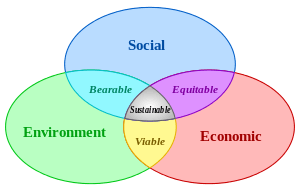Environmental organization

An environmental organization is an organization coming out of the conservation or environmental movements that seeks to protect, analyse or monitor the environment against misuse or degradation from human forces.
In this sense the environment may refer to the biophysical environment, the natural environment or the built environment. The organization may be a charity, a trust, a non-governmental organization or a government organization. Environmental organizations can be global, national, regional or local.
History
Founded on 28 May 1892 in San Francisco, California, Sierra Club was one of the first large-scale environmental preservation organizations in the world.[1]
Politics
Most organizations are in some way or try to be involved in policy making to exert more influence. Green politics is the political ideology which places a high importance on environmental goals and Green parties have formed to implement environmental policy at a government level.
Issues in focus
Some of the environmental issues that are of interest to environmental organizations are pollution, waste, resource depletion, human overpopulation and climate change.
List of environmental organizations
Notable global environmental organizations are the United Nations Environment Programme (UNEP), World Wide Fund for Nature,[2] the Intergovernmental Panel on Climate Change (IPCC), World Nature Organization (WNO), Greenpeace and Friends of the Earth.
Counter-movements
In order to counterbalance the sometimes progress- captalism- and economy-skeptic attitude and influence of environmental organizations, many interest groups and associations have been formed, most often industry-supported, seldom of purely ideological nature.
See also
- Environmentalism
- List of international environmental agreements
- United Nations Environment Program
- Greenpeace
References
Further reading
- Johnson, Erik W.; Scott Frickel (2011). "Ecological Threat and the Founding of U.S. National Environmental Movement Organizations, 1962–1998". Social Problems. 58 (Aug. 2011) (3): 305–29. doi:10.1525/sp.2011.58.3.305.
This study examines the role of "ecological threat" in shaping the U.S. environmental movement. … Declines in wildlife populations are associated with the foundings of wildlife and wilderness protection organizations while increases in air pollution are associated with the foundings of organizations focused on ecosystem well-being and public health.

